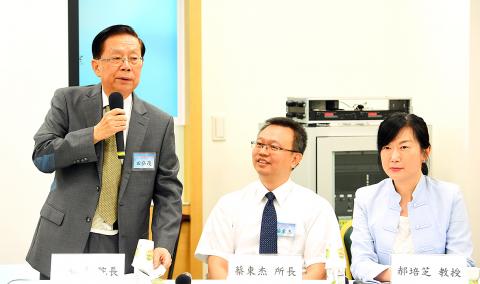The inclusion of Taiwan in China’s pending National Security Law means that China sees Taiwan as a major national security concern rather than as an internal affair or an issue of nationalism, suggesting that the issue is not up for compromise, academics told a forum hosted by the Institute for National Policy Research in Taipei yesterday.
After Chinese President Xi Jinping (習近平) last year expounded his outlook on Chinese national security, aiming to achieve the objectives in “eight dimensions and four stages,” China’s National People’s Congress began revising China’s National Security Law.
Article 11 of the law reportedly stipulates that protection of China’s sovereignty and territorial integrity is an obligation for all Chinese people, including the people of Hong Kong, Macau and Taiwan, and that no division is to be tolerated.

Photo: Lo Pei-der, Taipei Times
China has listed resolution of “the Taiwan issue” as one of its objectives in the proposed “third stage,” from 2021 to 2049, saying: “Appropriate measures must be taken to realize national unification and territorial integrity,” while including Taiwan in the law as part of its efforts toward achieving the goal, academics said.
For China, the nature of “the Taiwan issue” has changed from one sensitive to Chinese nationalism in the past to one that creates uncertainty about Chinese national security, because a separation of Taiwan divides Chinese sovereignty and territory and obstructs its plan to expand its maritime presence, National Taipei University professor Hao Pei-chih (郝培芝) said.
In view of the concerns, China is working on three fronts to resolve the issue, one of which is to “institutionalize” its claim that Taiwan is part of China by having Taiwan included in the National Security Law, launching the M503 commercial flight route and re-emphasizing its “Anti-Secession” Law, Hao said.
Meanwhile, China has continued to strengthen its armed forces while pushing for a military security coordination mechanism across the Taiwan Strait to counter the security alignment between the US and Japan, and to “decouple Taiwan from the alliance,” she said.
Tsai Yu-tai (蔡育岱), director of the Institute of Strategy and International Affairs at National Chung Cheng University, said the most salient element of Xi’s Taiwan policy is that he has produced what Tsai described as “a workable timetable” to resolve “the Taiwan issue.”
The characterization of Taiwan as an issue of national security concern to China marks a turning point in cross-strait relations, because it means that China considers its resolution imperative in response to changes in the international strategic environment, Tsai said.
That Taiwan is viewed as a national security concern paves the way for China to take military action against the nation.
It remains uncertain whether China would exercise its leverage over Taiwan through economic sanctions or launch attacks to resolve the issue, Tsai said.
“However, ‘securitization’ of the Taiwan issue has placed Taiwan in an even more difficult international environment because there will be no compromise with national security,” Tsai said.

Three Taiwanese airlines have prohibited passengers from packing Bluetooth earbuds and their charger cases in checked luggage. EVA Air and Uni Air said that Bluetooth earbuds and charger cases are categorized as portable electronic devices, which should be switched off if they are placed in checked luggage based on international aviation safety regulations. They must not be in standby or sleep mode. However, as charging would continue when earbuds are placed in the charger cases, which would contravene international aviation regulations, their cases must be carried as hand luggage, they said. Tigerair Taiwan said that earbud charger cases are equipped

Foreign travelers entering Taiwan on a short layover via Taiwan Taoyuan International Airport are receiving NT$600 gift vouchers from yesterday, the Tourism Administration said, adding that it hopes the incentive would boost tourism consumption at the airport. The program, which allows travelers holding non-Taiwan passports who enter the country during a layover of up to 24 hours to claim a voucher, aims to promote attractions at the airport, the agency said in a statement on Friday. To participate, travelers must sign up on the campaign Web site, the agency said. They can then present their passport and boarding pass for their connecting international

UNILATERAL MOVES: Officials have raised concerns that Beijing could try to exert economic control over Kinmen in a key development plan next year The Civil Aviation Administration (CAA) yesterday said that China has so far failed to provide any information about a new airport expected to open next year that is less than 10km from a Taiwanese airport, raising flight safety concerns. Xiamen Xiangan International Airport is only about 3km at its closest point from the islands in Kinmen County — the scene of on-off fighting during the Cold War — and construction work can be seen and heard clearly from the Taiwan side. In a written statement sent to Reuters, the CAA said that airports close to each other need detailed advanced

WEATHER Typhoon forming: CWA A tropical depression is expected to form into a typhoon as early as today, the Central Weather Administration (CWA) said yesterday, adding that the storm’s path remains uncertain. Before the weekend, it would move toward the Philippines, the agency said. Some time around Monday next week, it might reach a turning point, either veering north toward waters east of Taiwan or continuing westward across the Philippines, the CWA said. Meanwhile, the eye of Typhoon Kalmaegi was 1,310km south-southeast of Oluanpi (鵝鑾鼻), Taiwan’s southernmost point, as of 2am yesterday, it said. The storm is forecast to move through central